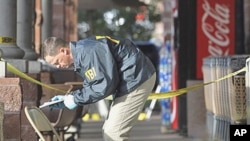The shooting rampage in Arizona that left six people dead and 14 injured has re-ignited concerns about security for politicians. Government prosecutors have portrayed the attack as an assassination attempt on an Arizona congresswoman, who was critically wounded. But providing security for members of Congress is logistically, financially, and politically difficult.
When Representative Gabrielle Giffords was shot, security was virtually nonexistent because most members of Congress neither have it nor want it. But in the wake of the Arizona incident, questions are being raised about both the need and feasibility of new security measures for them, especially when they are in their home districts and states.
Former Secret Service agent Joe LaSorsa, who served on the detail protecting President Ronald Reagan, says politicians do not like living in a so-called "security bubble" because they feel that cuts them off from voters.
"In a democracy our politicians are required to go out and press flesh, they are required to go out there and meet the people,” LaSorsa said. “And they have been accustomed to traditionally not being exposed to an overwhelming amount of violence directed towards individuals, especially individuals like congressmen and senators. But with the number of individuals out there in our society who are mentally ill, they do face a greater degree of exposure than ever before."
Members of Congress have been spending more time in their home districts than in Washington because of the need to raise funds to cover burgeoning campaign costs. It is also easier to get home now that cheaper and more convenient transportation is available.
LaSorsa, who owns a business training bodyguards, says simply providing members of Congress with bodyguards gives them a false sense of security.
"It is a comfort level that they think they are getting when they hire an individual to escort them,” LaSorsa added. “And then they believe, 'Oh, now I have security so I am okay.' Well, that is not always the case. You do have security, yes. You have a presence, yes. You have someone escorting you. But that does not mean that you are both not going to become targets because you do not know where the attack is coming from."
Another ex-Secret Service agent, Christopher Falkenberg, says personal protection has to be accompanied by good intelligence on potential threats.
"The most thoughtful approach to preventing these types of crimes is really a preventive one in which the effort has to be identifying people who are making threats and who are likely to be violent and intervening with them before they become violent,” said Falkenberg. “That by far is the most effective mechanism for maintaining the security of a public figure, including a public servant. The use of bodyguards and Secret Service details and agents, while it is very important, is really a last line of defense."
But security experts point out that even advance investigation may not have ever picked up on alleged shooter, Jared Loughner, since he is not known to have made any threat against Congresswoman Giffords. But Loughner’s bizarre behavior caused him to be ousted from a local community college.
Congressional leaders have full-time security provided by the Capitol Police, a force that protects the Capitol building and its environs. Rank-and-file members can request security if they feel they are under threat. But in most cases, members get security in their home district from local law enforcement if they request it. Analysts believe such requests will be more frequent in light of the Arizona shooting.
Some people have suggested expanding the Capitol Police’s size and jurisdiction. But Chris Falkenberg, now head of Insite Security in New York, says it is more likely Congress will move to reimburse local and state police for protective security costs.
"Representatives have really busy schedules,” Falkenberg added. “They do a lot of public events. I think it will be difficult to get local law enforcement to support those consistently. Perhaps one answer is going to be Congress, which is easily able to fund all these programs. Because, number one, they are the people in danger and, number two, they hold the purse strings – maybe they [can] release money to compensate local law enforcement for providing security."
Some lawmakers are known to carry guns in states or localities where the law permits it. But Capitol Police Chief Terrance Gainer says he does not think it is a good idea for members of Congress to carry guns for personal protection.


















